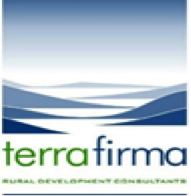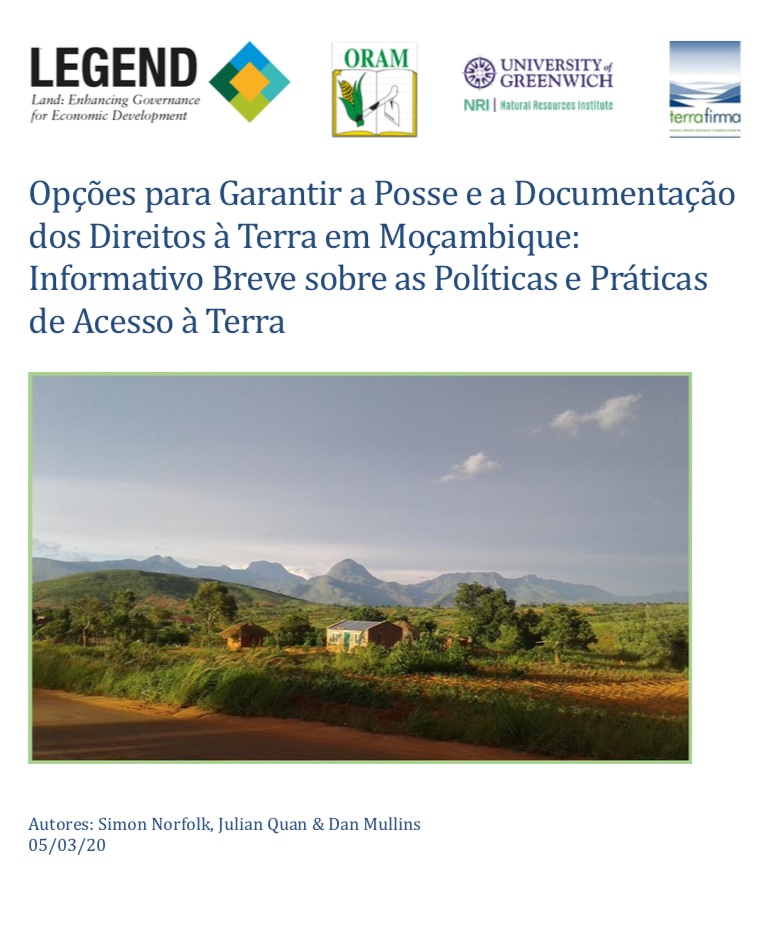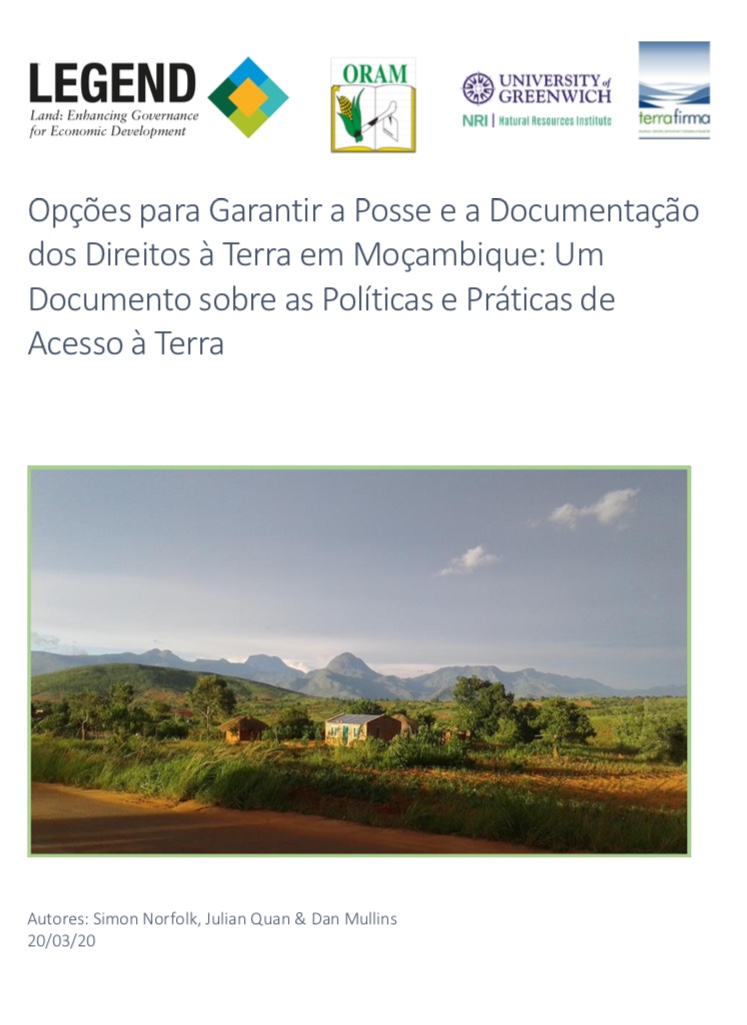Resources
Displaying 1 - 5 of 6Options for Securing Tenure and Documenting Land Rightsin Mozambique: A Land Policy & Practice Paper
One of the key aspects of the Mozambican legal framework for land is that Mozambican nationals can acquire tenure rights through inheritance, via peaceful occupation or through customary channels These usufruct tenure rights, known by the Portuguese acronym ‘DUAT’ (Direito de Uso e Aproveitamento da Terra), can be held individually or jointly.
Opções para Garantir a Põsse e a Dõcumentaçaõ dõs Direitõs a Terra em Mõçambique
Este documento informativo é baseado nos resultados e lições aprendidas em projectos realizados recentemente em Moçambique, financiados pelo programa LEGEND do DFID, nas análises mais amplas conduzidas por esse programa, e no conhecimento e experiência prática dos autores. O documento é um resumo de um Documento mais longo sobre Política e Práticas de Norfolk, S., Quan, J. & D.
Opções para Garantir a Posse e a Documentação dos Direitos à Terra em Moçambique
Um dos principais aspectos do quadro legal moçambicano de terras é que os cidadãos Moçambicanos podem adquirir direitos de posse por herança, por ocupação pacífica ou por canais costumeiros. Estes usufruem de direitos de posse, conhecidos pelo acrônimo em língua portuguesa 'DUAT' (Direito de Uso e Aproveitamento da Terra), que podem ser possuídos individualmente ou em conjunto.
Options for Securing Tenure and Documenting Land Rights in Mozambique: A Land Policy & Practice Brief
This Briefing Paper is based on the outcomes and lessons from projects recently completed in Mozambique, funded by DFID’s LEGEND programme, wider analysis conducted by that programme, and the knowledge and practical experience of the authors. The briefing is a summary of a longer Policy & Practice Paper by Norfolk, S., Quan, J. & D. Mullins (2020), “Land Policy and Practice in Mozambique: Options for Securing Tenure and Documenting Land Rights”.
CO-505233
General
Regional influencing climate action program The West Africa region has a high number of countries ranked among the most vulnerable to climate change in the world. In addition, this region has the largest number of countries where more than 30% of the population lives below the extreme poverty line (less than $1.90/day) and depends for its subsistence on activities that are highly sensitive toweather conditions: rain-fed agriculture, livestock breeding, fishing. These people are therefore particularly vulnerable to climatic shocks, which are increasingly recurrent and of unprecedented magnitude in the region. Climate action is not currently enough to achieve climate justice for those who rely on natural resources for their subsistence, those who have their food and nutrition security threatened by climate change. Their right to food, to land and forests are at risk as they are facing uncertainties in the middle of multiple climate shocks and stresses. Policies processes and implementation are not involving rural communities, women and youth organizations. The nationally determined contributions (NDCs) and adaptation plans are still to strengthen their human rights and gender equality aspects, while these frames need to improve nature-based solutions’ roles in their targets, to ensure the reduction of the emissions in the production sectors and the adaptation of communities’ livelihoods to CC effects. The climate action-influencing program in West African aims at achieving climate justice for women, youth and small-scale farmers so they realize their right to food and land rights, so that they can improve their resilience to climate change. Through alliances and supports to different stakeholders, our work on: 1) Climate and development policies (NDCs, NAPs, local development plans, etc.) to raise the adoption of agro ecology and agroforestry; 2) Climate governance spaces to hold governments accountable for their adaptation and mitigation commitments, especially regarding the communities, rural women and youth access to climate finance for their adaptation needs. The activities will take place in Burkina Faso, Mali, Niger and Nigeria, implemented by Oxfam offices in partnership with local partners involved in climate and environmental action. This project is framed to strengthen others climate change program and influence activities running in countries, such as the Regreening Africa project (Mali), the AACJ project (Burkina and Nigeria) and the JESAC project (Burkina).




